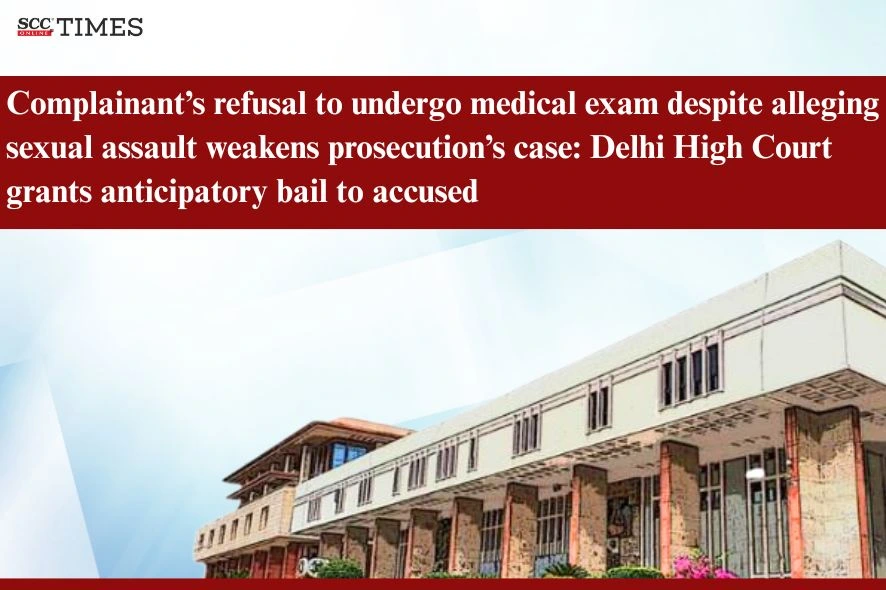Delhi High Court: In a petition filed under Section 528 of the Bhartiya Nagarik Suraksha Sanhita, 2023 (BNSS) for grant of anticipatory bail to person accused of committing sexual assault, a Single Judge Bench of Ravinder Dudeja, J, held that the refusal of the complainant to undergo medical examination to substantiate her claim of sexual assault, weakened her case and justified the grant of anticipatory bail.
Background
The complainant had alleged that she had received multiple threatening and abusive phone calls from an unknown number, allegedly made by the accused. She had also been allegedly threatened and warned by the accused persons, including the present accused, that her brother’s shop would not be allowed to function. Accordingly, a FIR under Sections 351(2), 79 and 3(5) of the Bhartiya Nyaya Sanhita, 2023 had been registered.
Prior to the FIR, the complainant’s brother had also filed a complaint alleging that the accused persons had entered in his office, brandished a country made pistol and stolen two gold chains and Rs 2 lakhs in cash as retaliation to their termination from employment.
During the investigation, the complainant’s statement under Section 183 of the BNSS was recorded, wherein she also alleged digital penetration, resulting in the addition of Section 70 of the BNS to the complaint.
The counsel for the applicants had averred that the Call Detail Records (CDR) showed that the complainant herself had made two phone calls to the co-accused. It was also submitted that the families of the complainant and accused knew each other and were involved in a property dispute and the FIR against the accused was with the intention of falsely implicating the accused persons to extort money and pressurise them in context of the civil property dispute. Furthermore, the fact that the FIR was registered three days after the alleged incident without any cogent reason for delay and that the complainant had refused to undergo medical examination to corroborate her allegations, cast a shadow of doubt on the veracity of her claims.
Analysis, Law, and Decision
The Court noted that a comparative analysis of the initial complaint filed by the complainant and the subsequent statement given under Section 183 BNSS were in stark contradiction. While the initial complaint made no mention of sexual assault, the Section 183 BNSS statement contained graphic details of sexual assault and rape. The Court opined that such discrepancies cast doubt on the reliability and spontaneity of her statements.
The Court further noted that the conscious refusal of the complainant to undergo medical examination despite the nature of allegations, was a relevant factor that weakened her case. Additionally, the CDR records, that showed that the complainant had called the co-accused and not the other way around, contradicted her assertion that she had received threatening calls from the accused and co-accused.
The Court opined that no material had been placed on record to indicate that the accused was a flight risk or that his custodial interrogation was essential. The Court stated that arrest must not be mechanical or automatic, especially when no necessity for custodial interrogation is demonstrated. Mere apprehension of non-cooperation could not override the principle of ‘bail, not jail’.
Accordingly, the Court granted the accused anticipatory bail, contingent upon furnishing a personal bond of Rs 30,000 and surety of the same amount. The accused was further restricted from interfering with the investigation, contacting the complainant and her family and tampering with any evidence or approaching any witnesses. Violation of any of the conditions would lead to automatic revocation of the anticipatory bail.
[Arpit Mishra v. State (NCT of Delhi), 2025 SCC OnLine Del 4946, decided on 17-7-2025]
Advocates who appeared in this case:
For the Petitioner: Maninder Singh (Senior Advocate), Ajay K. Pipaniya, Turang Pandit, Harsh Tomar, Sanjana Nair, Janvi Narang, Anurupita Kaur, Advocates
For the Respondent: Shubhi Gupta (APP), Kanika Jain (SI)


